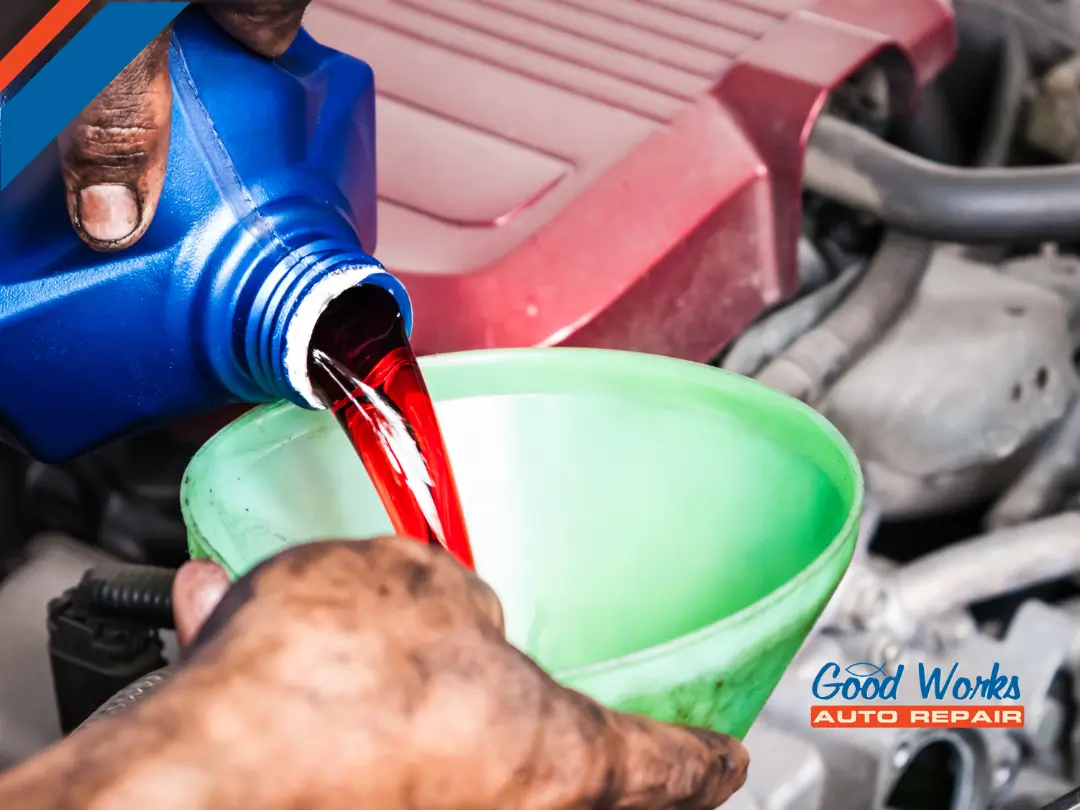The role of transmission fluid is often overlooked. However, it plays a significant part in ensuring that your vehicle runs smoothly. When you understand its purpose, what maintenance is required, and the importance of regular checks by a mechanic, you may be able to prevent costly repairs and help your vehicle last longer.
In this guide, we’ll discuss some of the most important things you need to know about transmission fluid to promote optimal transmission performance.
What is Transmission Fluid?
Transmission fluid is a specialized lubricant essential for the operation of your vehicle’s transmission system. It acts as a coolant, lubricant, and hydraulic fluid, facilitating smooth gear changes and minimizing wear on moving parts. By maintaining the proper transmission fluid levels, your vehicle can run more efficiently and safely.
What is the Purpose of Transmission Fluid?
Transmission fluid has 4 key functions:
- Lubrication: Reducing friction between moving parts helps prevent excessive wear and tear.
- Cooling: By dissipating heat generated by the transmission, overheating can be prevented.
- Hydraulic capabilities: Transmission fluid enables smooth gear shifting by transmitting power within the transmission system.
- Cleaning: Transmission fluid contains detergents which help to clean internal parts and prevent sludge buildup.
Are There Different Types of Transmission Fluid?
Yes. Different vehicle makes and models require different types of transmission fluid. That’s why it’s important to use the specific type recommended by your vehicle’s manufacturer. Common types include:
Automatic Transmission Fluid (ATF): As the name implies, this is used in automatic transmissions and provides lubrication, cooling, and hydraulic functions.
Synthetic ATF: This type of automatic transmission fluid offers better performance in extreme temperatures and a longer fluid life.
Continuously Variable Transmission (CVT) Fluid: This type is designed specifically for vehicles with CVT systems.
Manual Transmission Fluid: Often thicker than ATF, this type is used in manual transmission systems.
3 Telltale Signs That Your Transmission Fluid Needs Attention
If you notice any of the following, talk to your trusted mechanic:
- Dark or Dirty Fluid: Transmission fluid should be a clear red or pink.
- Slipping Gears: When operating normally, your vehicle should shift between gears smoothly.
- Strange Noises: Do you notice a grinding or whining sound when your car changes gears? The transmission fluid may be old or contaminated.
Transmission Fluid Change vs. Flush: What’s the Difference?
The words ‘transmission fluid change’ and ‘transmission fluid flush’ are sometimes used interchangeably. However, they’re actually two different maintenance procedures. A fluid CHANGE indicates draining out approximately 50-70% of the old fluid and then adding new.
In contrast, a transmission FLUSH means that all of the old fluid is removed. A special machine is used to completely eliminate the old fluid and any contaminants inside the system. Then, all new fluid is added. While a fluid change is simpler and quicker, a flush provides a more thorough cleaning of the transmission system.
What Are the Consequences of Not Changing Transmission Fluid at the Recommended Intervals?
It’s important to change or flush transmission fluid according to the frequency recommended by your vehicle’s manufacturer. This is typically every 30,000 miles. If you neglect regular fluid changes, you may experience poor shifting performance, overheating, and increased wear and tear on transmission parts. This can potentially result in expensive repairs or even premature transmission failure.
Schedule Preventative Maintenance at Our Tempe Auto Repair Shop to Ensure Optimal Transmission Performance
As you can see, transmission fluid is vital for your vehicle’s performance and longevity. Regular checks and maintenance can prevent common transmission issues and ensure smooth, reliable operation. By understanding the role of transmission fluid and staying proactive with its care, you can keep your vehicle running at its best for years to come.
At Good Works Auto Repair, we believe that routine transmission flushes are part of a smart preventative maintenance schedule. We typically recommend this service every 30,000 miles but that interval may vary slightly depending on your vehicle’s make and model. Regardless, investing in routine maintenance now can save you from costly repairs down the road and keep you driving safely.
Contact us to schedule an appointment today!






